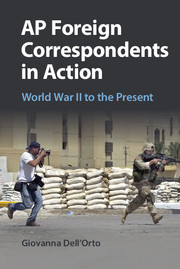Book contents
- Frontmatter
- Dedication
- Contents
- List of Figures
- Acknowledgments
- 1 Introduction
- 2 Getting Ready, Getting Started, and Getting Lost in Translation
- 3 What's the Story? News Judgment, News Pitches
- 4 Getting to the Sources (and Keeping Them Alive)
- 5 Being an American Abroad – Perceptions of Journalists
- 6 Eyewitness Reporting: Getting to the Scene
- 7 The Costs of Being There to Count the Bodies
- 8 Your Byline Today, Mine Tomorrow: Teamwork and Competition
- 9 Access, Censorship, and Spin: Relating with Foreign Governments
- 10 Flacks, Spooks, GIs, and Objective Journalists: Relating with the U.S. Government Abroad
- 11 Getting It Out, Getting It Edited: Filing News, Working with the Desk
- 12 The Evolving Milkmen: Writing for an Audience
- 13 Purpose and Influence of Foreign Correspondence
- 14 Eight Decades of Bearing Witness and Telling the World's Stories: Conclusions
- Bibliography
- Index
14 - Eight Decades of Bearing Witness and Telling the World's Stories: Conclusions
Published online by Cambridge University Press: 05 November 2015
- Frontmatter
- Dedication
- Contents
- List of Figures
- Acknowledgments
- 1 Introduction
- 2 Getting Ready, Getting Started, and Getting Lost in Translation
- 3 What's the Story? News Judgment, News Pitches
- 4 Getting to the Sources (and Keeping Them Alive)
- 5 Being an American Abroad – Perceptions of Journalists
- 6 Eyewitness Reporting: Getting to the Scene
- 7 The Costs of Being There to Count the Bodies
- 8 Your Byline Today, Mine Tomorrow: Teamwork and Competition
- 9 Access, Censorship, and Spin: Relating with Foreign Governments
- 10 Flacks, Spooks, GIs, and Objective Journalists: Relating with the U.S. Government Abroad
- 11 Getting It Out, Getting It Edited: Filing News, Working with the Desk
- 12 The Evolving Milkmen: Writing for an Audience
- 13 Purpose and Influence of Foreign Correspondence
- 14 Eight Decades of Bearing Witness and Telling the World's Stories: Conclusions
- Bibliography
- Index
Summary
This analysis of more than 1,700 years of work by AP foreign correspondents has documented their practices, as well as the array of constraints on them, to shed new light on the essence and impact of the bulk of foreign news content reaching the American public through eight decades of U.S. dominance in world affairs. The history of how and why correspondents wrote the stories that brought the world home – derived not only from the correspondents’ candid and vivid descriptions, but by a few hundred of the stories themselves – provides the missing link in the understanding of the impact of foreign news on international relations. On the premise that journalistic content affects both public opinion and the range of policymaking options by building a certain set of images of foreign realities, the previous chapters have taken us, for the first time, on an unfiltered tour inside the construction site.
Much like the correspondents’ reporting objective, the goal in telling their stories – in their own voices – is to understand not only what they do, and therefore the news that they produce, but also what the future might hold for both the profession and the content. To quote Kathy Gannon (23), “the more knowledge we have, the better our questions … knowing what questions to ask is much more important than thinking you have all the answers” – and that applies just as well to scholarship as to interviewing Afghan villagers or Pakistani leaders. In this final chapter, then, the knowledge gained through the history of coverage of the world by The Associated Press informs questions about the possible future of foreign correspondence.
The timing for such query could not be more urgent. In the mid-2010s, a dangerous temptation for disengagement is spreading in both American foreign policymaking and journalism. The partial image of a world where power is diffused and fragmented, and information flows through connected social media citizens, can too easily become the convenient, and cheap, excuse for policy vacillation and media retrenchment. But the more we withdraw, the less we know; the more we ignore, the less we understand; and that lack of comprehension is bound to have devastating consequences when real events – land grabs, beheadings, environmental disasters, all impervious to our indecision – ultimately force policymakers, journalists, and citizens to engage.
- Type
- Chapter
- Information
- AP Foreign Correspondents in ActionWorld War II to the Present, pp. 359 - 376Publisher: Cambridge University PressPrint publication year: 2015



